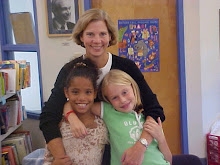Friday, January 31, 2014
Science pond
Every day in this cold, cold weather, the excavators and the big dump trucks are working away. We have all watched with fascination as the new science pond takes shape!
The pond will be a great feature of our outdoor-based science program and a centerpiece for exploring water ecosystems, clean water advocacy, and STEM.
It is being dug at the site of what we believe was the former farm pond. When it is done, it will be about a half-acre in size, with gently graduated sides and a depth of 8 feet in the center. We’ll put some split-rail fencing with mesh at crucial spots around the perimeter and plan to add a deck and a pond shed for storing buckets and nets and all the other equipment needed for pond exploration.
The strategic idea for a science pond came about at forums and discussions with trustees, parents and teachers about how to maximize the natural science features at Parker. The streams, woods, meadows and wetlands are all wonderful elements of discovery and analysis for our students, so creating our very own pond seemed to be the natural next step. With the generous initial funding of a special donor and the guidance of the school’s Planet Parker Committee, coordinated by Jamie Crouse, we were able to get started this winter.
One of the biggest questions for the Planet Parker Committee was “Where do we put the fill?” Take a look at the east side of our parking lot and you will see the natural solution to our parking issues when we have big events: an expanded parking area! We will keep it grassy and it will be great for parking overflow.
The next phase of the project is watching the pond fill with water from the water table. I am sure there will be mud! But then the native plants will fill in on the banks and the meadow will seed itself again. Students have been charting the man-made changes to the site and now they will have the opportunity to see how the land restores itself and what wildlife and plants make their new home at the Parker pond!
Thursday, January 23, 2014
Proud of our alumni
 | ||
| At the Alumni Assembly on January 10 |
These young people are attending colleges
like Cornell, Johns Hopkins, and the College of Nanoscale Science and Engineering and are involved in about a million interesting things.
Some of their interests:
Soccer, writing a literary magazine,
Irish dance, crafting, robotics, engineering, sketch comedy, giving kosher gastronomical
walking tours of Budapest, learning Russian, playing guitar, community service,
science Olympiad, mentoring, jazz, marching band, unicycling
Some of
their Parker thesis topics:
Banned
Books, French Cooking, The Evolution of Cosmetics, Mass Produced Food, Video
Game Addiction, Fuel Efficient Vehicles, Substance Abuse
We feel so
proud of our graduates. A parent of one
just told me that what Parker does best is create leaders. “It’s the confidence,” he said. “Parker kids are willing to quietly lead,
to help others, to be kind. It’s part of
who they are.”
Tuesday, January 14, 2014
Building, tinkering, and sharing - but it's more than that
I started out thinking I'd write about Scratch - the coding program that our Computer Club is working with under the guidance of our former math and science teacher Teresa Ferrer-Mico. Teresa is completing a PhD and one of her projects is teaching kids Scratch. Here is a great description of what Scratch is and why it's so cool to teach it.
But as one idea leads to another I started thinking about all the ways Parker kids are learning by doing, building, tinkering, and sharing. It happens all over the school and it is leading our students to habits of mind that are vital to their success - and intimately linked to how they are naturally motivated to learn, as we now have proof from the research of neuro-scientists.
Kids' minds thrive on solving problems, and when presented with appropriate problems (big, complex ones) and an openness to diverse solutions using a wide variety of materials, their motivation soars and their skills in agency, grit, innovation, and collaboration develop at astonishing rates.
Examples: LEGO Robotics in all the grades; mounting a "pattern museum" in Kindergarten; inventing a better bee hive or building a wind powered machine in 4-5; inventing ways to clean up an oil spill in 2-3; building a bridge in 6-7 STEM.
I am excited about our kids and their futures! Here are some comments from our alumni panel on Friday - they were mainly college kids (Cornell, Johns Hopkins, Bard, College of Nanoscale Science and Engineering, St. Rose...) who answered the question, "What did you learn at Parker that helped you most in high school and college?" I swear, we didn't script this.
- Writing a thesis - I can write a great paper or essay
- Not having grades made me more self-motivated than other kids
- Small classes - I got to know my teachers so well, and in high school and college getting to know my teachers is a huge advantage
- Working with people - I'm better at that than most of the kids I encounter
- The advanced curriculum - learning algebra and earth science let me move ahead in high school to accomplish my dreams quicker
- The close community and the connection with teachers gave me confidence
- Project-based learning - it's what the real world is all about - in my college and in my job
- Openness to other people and other ways of thinking has helped me to explore more
- Parker allowed me to learn about things I'm interested in and gave me the freedom to explore
Subscribe to:
Posts (Atom)







